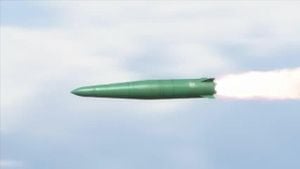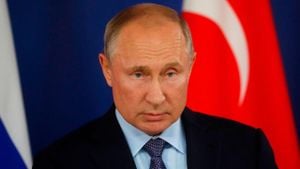Vladimir Putin has made headlines again by asserting Russia's use of hypersonic missiles as he ramps up threats against the West, particularly amid the continuing turmoil of the Ukraine conflict. Speaking recently, the Russian president hailed these weapons as "unstoppable," signaling not only his country's military advancements but also casting shadows over the geopolitical balance of power.
The remarks followed the launch of the intermediate-range "Oreshnik" ballistic missile, which struck Ukrainian targets, marking yet another escalation in the nearly three-year-old conflict. Putin claimed, "There is no countermeasure to such a missile, no means of intercepting it, in the world today," which certainly raises eyebrows. Such statements contribute to growing fears of wider conflict, as the line between defensive maneuvers and escalatory rhetoric blurs.
Putin justified the missile strikes as retaliatory actions against what he terms Western aggression. According to him, the missile attack on Dnipro was prompted by Ukraine's strikes against Russia utilizing long-range missiles supplied by the U.S. and the U.K. "We will continue testing this newest system," he declared, leaving little doubt about his intentions.
Adding fuel to the fire, Putin insinuated the possibility of targeting Western military facilities if they continued supporting Ukraine. He stated, "We are entitled to use our weapons against the military facilities of those countries allowing their weapons to be used against our facilities." This statement carries significant weight, considering the widespread concern over potential escalations involving NATO countries.
The new missile, equipped with the potential for multiple conventional warheads, is reportedly capable of delivering devastation similar to nuclear weapons. Russian air defense reports detail its range, claiming it can reach over 3,400 miles, effectively bringing much of Europe within its strike radius. Despite the ominous tones of Kremlin officials, it’s notable they did notify the United States about the missile test shortly before its execution—30 minutes prior to launch.
This past week has underscored what some analysts see as one of the most significant escalations since the war's commencement, eroding any remaining hopes for peace talks between the warring parties. The heightened military activity was not just rhetoric; it was part of Russia's overarching strategy to regain territory lost to Ukraine, particularly following Ukraine's rapid military advances earlier this year.
Also, as Russian troops have reportedly deployed approximately 59,000 soldiers to the Kursk region following Ukraine’s surprise incursion there, the dynamics on the ground have shifted. A senior Ukrainian military source indicated the significant territorial losses, stating the area once firmly held by Ukraine is now vastly reduced—a concerning development for Kyiv.
The stakes have risen exponentially, and NATO's commitment has been thrown back under the spotlight as well. Military leaders on both sides are aware of the potential consequences if miscalculations occur. The series of missile launches and aggressive rhetoric have led some leaders, including Polish officials, to warn of the serious risk of global conflict.
Poland's Prime Minister has reiterated those concerns, asserting the threat of a world war is both serious and real, emphasizing the need for vigilance and strategy. Various NATO member states, including the Baltic nations, are feeling the pressure and preparing for any eventuality.
This situation prompts some urgent discussions among defense strategists and political leaders about the need for solidarity among NATO allies. Uniform responses are necessary if the situation escalates or if bases across Europe face incursions.
A recent meeting planned between NATO and Kyiv leaders is aimed at confronting the heightened tensions and strategizing on unified military responses. Such gatherings are becoming increasingly common as hard-line stances become the norm rather than the exception.
Experts warn of the unpredictable nature of missile technology, especially hypersonics, which travel at speeds exceeding Mach 5—five times the speed of sound. Their quick strikes make detection problematic, complicate existing defense frameworks, and create additional strategic challenges for opposing forces. While such military advancements by Russia seem alarming, the international community is bracing for possible counteracting measures.
Military experts insist on the importance of keeping adversarial capabilities at the forefront. Tracking missile deployments, strengthening air defenses, and enhancing surveillance systems are pivotal moves for nations situated within the danger zones. The innate unpredictability of advanced missile technology has landed defense analysts' efforts at the technological forefront.
The whole scenario serves as both a reminder and warning—a stark reflection of how rapidly military capabilities can alter strategic balances. Indeed, the world is watching Moscow, not just to assess the legitimacy of their claims of unstoppable weapons, but to gauge how such statements and actions, intertwined with defense networks and political alliances, might shape the fabric of global security.
With the situation continuing to develop, both military and political responses will be pivotal moving forward. So as the clock ticks and new threats loom, one thing is clear: these turbulent times urge strong hearts and sharp minds.



